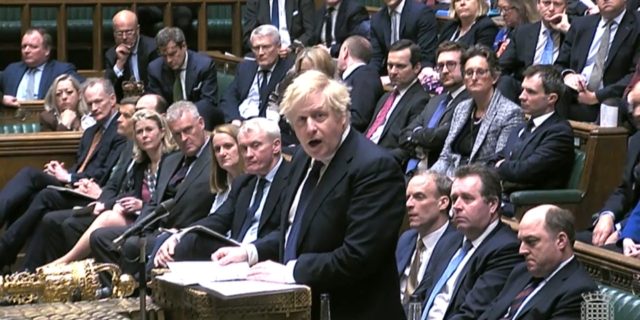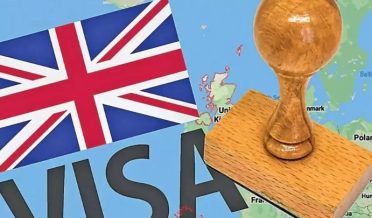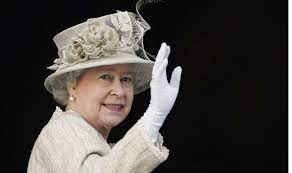The contrast between the upbeat tone of the prime minister’s new year message and the political cloud hanging over him as he goes into 2022 could not be starker. Boris Johnson said Britain is in an “incomparably better” state in the fight against Covid than it was at the start of 2021; thanks to the scientific research that produced a vaccine in less than a year, that is certainly true. But Johnson begins the new year as an irrevocably weakened political figure, his poll ratings significantly down from a year ago, his authority within his own parliamentary party eroded. Just two years after winning a decisive parliamentary majority of 80, this will be the year that requires him to fight for his survival. While 2022 will hopefully bring a diminishing of the disruption and harm caused by Covid, it will also see the launch of the independent inquiry into the government’s handling of the pandemic. Johnson’s dreadful errors of judgment over the last 21 months will be raked over: his decisions to hang back in introducing social restrictions not once, not twice, but three times cost too many people their lives, and still more the hardship of living under harsher social restrictions for longer because of his delays. It is likely that the cost-of-living crisis will further damage Johnson politically in the coming months. The inquiry may also uncover further revelations about Johnson’s hypocrisy in his approach to enforcing the social restrictions he imposed on the country within his own residence. The Cabinet Office investigation into the Downing Street parties will report and, if it generates evidence that the law was broken, may even lead to a police investigation. Johnson will also continue to face scrutiny over his lack of probity around declaring political donations. The country is facing an acute cost of living crisis that the government has made immeasurably worse through its policies. A decade of tax credit cuts enacted by successive Tory chancellors – which effectively paid for tax cuts for more affluent families – has eroded the incomes of low-paid parents, for some households by thousands of pounds a year. Yet this did not stop Johnson enacting a further tax credit cut of £1,000 a year in October, the biggest overnight benefit cuts for low-income families with children in history. The increase in generosity of the universal credit taper rate the government introduced in November still leaves three-quarters of families on universal credit worse off, and despite the pandemic, unemployment benefits are now at their lowest real rates since 1990. These cuts will hit families living in the constituencies the Conservatives won from Labour in the so-called red wall much harder than those in their heartlands and will make it even harder for families to cope with fast-rising housing, energy and food costs. It is likely that the cost-of-living crisis – and the lack of government support to help the lower-paid weather the storm – will further damage Johnson in the coming months. The Brexit that Johnson so coveted as a cynical route to the premiership will also continue to throw up difficulties. The key Brexit conundrum remains unsolved: there is no Brexit that involves a complete break with all the EU’s regulations and institutions that is compatible with both no border in the Irish Sea and no border on the island of Ireland. Given that the UK willingly sacrifices sovereignty in exchange for trade in other trade agreements, it seems extraordinary that this should become the sticking point of principle over which Conservative politicians are willing to undermine the Good Friday agreement. But thanks to the ideologues of the Eurosceptic right, that is where we are. Johnson’s approach thus far has been to pretend this irresolvable dilemma does not exist, misleading the public that the Northern Ireland protocol would involve no customs checks on goods coming from Northern Ireland into the rest of the UK. And the insidious economic impact of Brexit will continue; voters do not need to associate its economic malaise with Brexit itself to hold the government responsible for the state of the economy as we move towards the next election. Voter discontent with the government has translated into a consistent poll lead for Labour in recent weeks. This creates a window of opportunity for Keir Starmer to position Labour as a government in waiting, one the country can get behind. There have been some important achievements in the first 20 months of Starmer’s leadership. He has begun the journey towards rooting out antisemitism from his party, suspending Jeremy Corbyn from the party after he minimised the findings of the statutory regulator, the Equality and Human Rights Commission, on antisemitism in Labour. He has introduced rule changes that should help ensure future leaders are more appealing to Labour voters. And after a botched reshuffle last May, he has recently promoted promising talent to Labour’s frontbench. It is far too early to write him off altogether, but we begin 2022 with a glimmer of hope that there may be an end in sight to the corruption, hypocrisy and incompetence of Boris Johnson and the damage his premiership continues to wreak on Britain. That is sufficient to make the new year wishes for good health, wellbeing and prosperity glow with a political optimism that was absent 12 months ago.
 183
183






